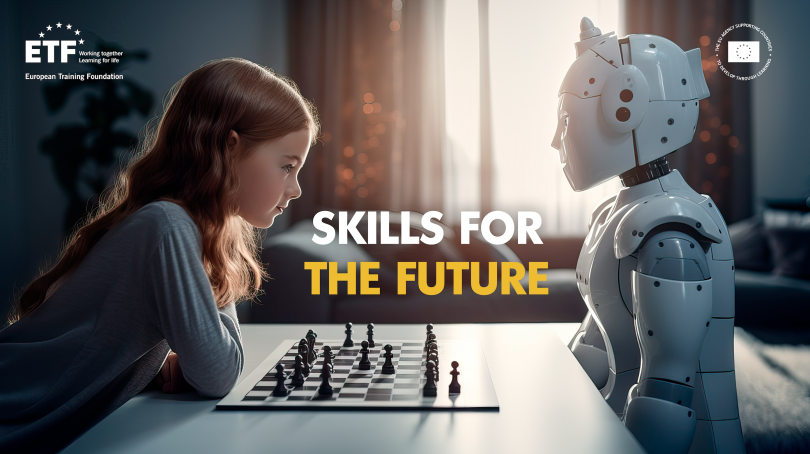
The future looks bright with skills
Driven by new technologies that blend the physical, digital and biological worlds, the fourth industrial revolution is transforming industries, economies and societies around the world. One just has to think of the rapidly growing platform economy to envisage how labour markets are undergoing massive change or the impact of artificial intelligence presenting new challenges to education and learning systems.
Other global trends such as shifting demographics, migration and climate change are intensifying this process. Different national and regional contexts require different solutions and alternative pathways to equip and re-equip people with the knowledge and skills they need for life and work in the world of tomorrow. Their impact and how they are managed varies from place to place.
The ETF's communication campaign throughout January and February focuses on skills for the future, highlighting ETF activities working with countries in the EU’s neighbouring regions and beyond to support economic growth and prosperity. Working in partnerships and recognition of the increased fragility in the geopolitical landscape is a crucial part of our approach.
The celebration of the ETF’s 30th anniversary this year and its long and rich experience provides the perfect backdrop to look into the future and predict as far as possible the skills needed and prepare for the unknown. To guide us, the 2024 work programme aligned with the ETF's mission and the overarching strategy 2027, focuses on three key strategic objectives: ensuring skills relevance and anticipation, supporting skills development and validation, and enhancing the performance and quality of education and training policies.
During these months we will engage policymakers, practitioners, representatives from the private and civic sectors, NGOs, and internationally renowned experts to discuss how best to future-proof education and skills development systems. Join us!
ETF activities in focus in 2024
- Regular and in-depth analysis on changing skills demand in partner countries including platform work, artificial intelligence, and assessment of the effectiveness of active labour market policies.
- Strengthening the link between vocational education and training (VET), and particularly higher VET with continuing vocational training as a key component in building innovative systems to spur economic growth.
- Connecting learning environments, supporting personalised and differentiated learning, introducing new methods and ideas in curricula to optimise learning of key competences, digital and online learning activities, and enhancing the qualifications of educators.
- Connecting practitioners and stakeholders through specialised networks and highlighting examples of excellence as with the ETF's Network for Excellence to encourage the sharing of ideas, practices and experience between centres of vocational excellence at both national and international levels.
- Supporting national qualifications frameworks and reciprocal referencing of qualifications systems, and the validation of non-formal and informal learning to ensure recognition of the knowledge and skills people possess as stepping stones to future professional endeavours. More here.
- Working with EU neighbouring and Central Asian countries to further develop national career development support systems following a structured and systematic approach.
- Engaging business intermediaries and trade unions in connecting SMEs and education and training in the context of the twin digital and green transitions for innovation, productivity-enhancing skills, and quality of work. More here.
- Engaging civil society as an important partner within governance arrangements on skills development for healthy and equitable skills development ecosystems that ensure progress and growth for all.
- Building skills intelligence for policy reform, including regular periodical assessment via the ETF's Torino Process on the effectiveness of vocational education system reforms in partner countries leading to recommendations for policy and potential follow-up actions.
- Working in partnership with other international and bilateral organisations operating in the same countries to ensure that skills development is a core component of all donor projects, for example with banks and international financing institutions. More here.
- Supporting the skills dimension of migration through studies and analysis of migrants' learning pathways and how they interact with lifelong learning systems and labour markets in partner countries and the EU.
Did you like this article? If you would like to be notified when new content like this is published, subscribe to receive our email alerts.